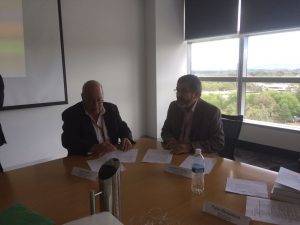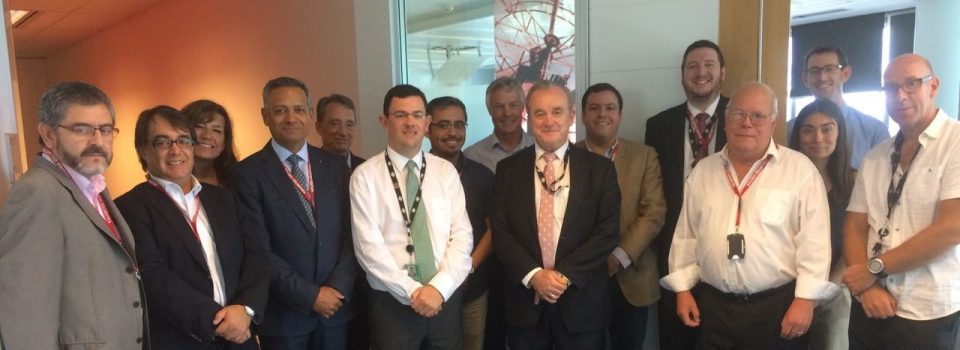Instituto de Fomento Pesquero and CSIRO Scientific Center of Australia join efforts to improve fisheries research in Chile
January 25th, 2017
Signing of the agreement
The main research centers in Chile (IFOP) and Australia (CSIRO) signed a commitment to cooperate for improving research on Chilean fisheries by signing a Cooperation Agreement, the development of scientific activities and capacity training, with a major focus in the implementation of the ecosystem approach to fisheries.
On January 23, in the city of Canberra, Australia, an agreement on scientific and technological cooperation between the Instituto de Fomento Pesquero (IFOP) and the Commonwealth Scientific and Industrial Research Organization (CSIRO) of Australia was signed on.
The agreement was signed by the Executive Director of IFOP, Leonardo Núñez Montaner and the Scientific Director of Oceans and Atmosphere of CSIRO, Dr. David Smith.
CSIRO is a Public Research Center, has among its objectives, the activities of basic and applied scientific research, technological innovation, development and specialized human training in the fields of physical oceanography, biological oceanography, climatology, meteorology, aquaculture, biotechnology, biology, microbiology, ecology, seismology, geophysics, geology, electronics, instrumentation, telecommunication, optics, optoelectronics, computing, telematics, information technologies and related disciplines, disseminate the results of their research, as well as teaching activities in these areas of science, being able to execute and impart higher education in programs for undergraduate, master’s, doctor’s degree and postdoctoral studies.
Leonardo Núñez, referred to the importance of signing this agreement for IFOP: “for us it is very important to have CSIRO as a partner, as it is not only one of the most important marine research institutes in the world, but also we share common research interests in the Pacific. In addition, CSIRO’s experience in fishery recovery and application of the ecosystem approach to fisheries is key for the moment Chilean fisheries are undergoing.”
Prior to the signing of the Cooperation Agreement, the Executive Director of IFOP and the Head of the Fisheries Research Division, Mauricio Gálvez, had the opportunity to learn about CSIRO’s experience and held meetings with authorities and scientists from the Australian Fisheries Management Authority (AFMA); Department of Agriculture and Aquatic Resources (ABARES); Fisheries Development and Research Corporation (FRDC), among others.
Mauricio Gálvez, in turn referred to the content of the Cooperation Agreement in the following terms: “Although this is a framework agreement, it has two special characteristics: it sets the principles of quality and reciprocity, which puts us as partners with CSIRO; and specifically sets out the areas in which IFOP is interested in receiving cooperation. ” “We are going to take some fisheries as study cases and CSIRO scientists together with IFOP scientists, are going to carry out assessments of management strategies, ecological risk, and apply ecosystem models to groups of national fisheries. This will require training courses and training for the programming of advanced models for our researchers,” commented Mr. Gálvez.
The link of IFOP with CSIRO is part of a broader initiative which is being promoted by the Executive Direction of the Institute and aims to position its researchers in the main knowledge networks in fisheries science and aquaculture. This is why we are making advances in agreements and joint work with other institutions such as IMARPE in Peru, INIDEP in Argentina, CISESE in Mexico, the Spanish Institute of Oceanography and also with national institutions and universities.
Prior to the Canberra visit for the signing of the Cooperation Agreement, the Head of the Fisheries Research Division of IFOP participated with the delegation of Chile at the Fifth Meeting of the Regional Organization for Fisheries Organization of the South Pacific (ROFO SP), which took place in the city of Adelaida, and where it acted as the main negotiator for Chile, especially in the discussions concerning the establishment of the international quota of horse mackerel and the respective allocations between the countries, where Chile obtained very favorable results that allowed it to maintain Its allocation percentage for 2017 and to consolidate a fixed allocation mechanism for 5 years.
